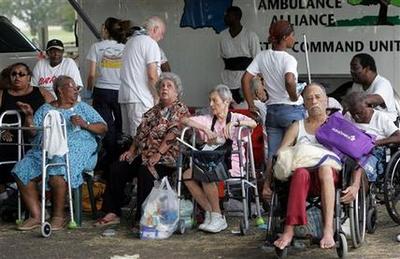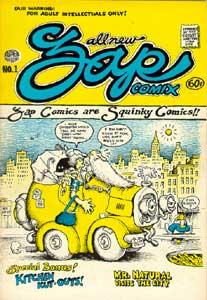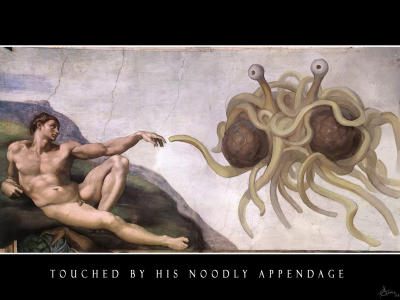Darwin tells us that we are no more than assemblages of complex molecules. We should celebrate this.
By George Monbiot. Published in the Guardian 16th August 2005
All is not lost in America. When George Bush came out a couple of weeks ago in favour of teaching “intelligent design” – the new manifestation of creationism – the press gave him a tremendous kicking. The Christian Taliban have not yet won.
But they are gaining on us. So far there have been legislative attempts in 13 states to have intelligent design added to the school curriculum.(1) In Kansas, Texas and Pennsylvania, it already has a foot in the door. In April a new “museum of earth history” opened in Arkansas, which instructs visitors that “dinosaurs and humans did co-exist”, and that juvenile dinosaurs, though God forgoet to mention it, hitched a ride on Noah’s Ark.(2) Similar museums are being built in Texas and Kentucky. Forty-five percent of Americans, according to a Gallup poll last year, believe that “human beings did not evolve, but instead were created by God … essentially in their current form about 10,000 years ago.”(3)
And not just in America. Last month the Catholic archbishop of Vienna, Cardinal Christoph Shönborn, asserted that “any system of thought that denies or seeks to explain away the overwhelming evidence for design in biology is ideology, not science.”(4) He appears to have the support of the new Pope.(5) Last week the Australian education minister, Brendan Nelson, announced that “if schools also want to present students with intelligent design, I don’t have any difficulty with that.”(6) In the UK, the headmaster of one of Tony Blair’s new business-sponsored academies claims that evolution is merely a “faith position”.(7)
The controversy fascinates me. This is partly because of its similarity to the dispute about climate change. Like the climate change deniers, the advocates of intelligent design cherry-pick the data that appear to support their case. They ask for evidence, then ignore it when it’s presented to them. They invoke a conspiracy to explain the scientific consensus, and are unembarrassed by their own scientific illiteracy. In an article published in the American Chronicle on Friday, the journalist Thomas Dawson asserted that “all of the vertebrate groups, from fish to mammals appear [in the fossil record] at one time” and that if evolution “were true, there would be animal life fossils of particular animals without vision and others with varying degrees of eye development … Such fossils do not exist.”(8) (The first fish and the first mammals are in fact separated by some 300 million years, and the fossil record has more eyes, in all stages of development, than the CIA).
But it fascinates me also because natural selection is such a barren field for the fundamentalists to till. For 146 years Darwinian evolution has seen off all comers. There is a massive accumulation of evidence – from the fossil record, to genetics, to direct observation – which appears to support it. Were they to concentrate instead on the questions now assailing big bang theory,(9) or on the failure so far to reconcile gravity with quantum physics, or on the stubborn non-appearance of the Higgs boson and the abiding mystery of the phenomenom of mass, the Christian conservatives would be much harder to confront. Why pick on Darwin?
It is surely because, as soon as you consider the implications, you must cease to believe that either Life or life are affected by purpose. As G. Thomas Sharp, chairman of the Creation Truth Foundation, admitted to the Chicago Tribune, “if we lose Genesis as a legitimate scientific and historical explanation for man, then we lose the validity of Christianity. Period.”(10)
We lose far more than that. Darwinian evolution tells us that we are incipient compost: assemblages of complex molecules that – for no greater purpose than to secure sources of energy against competing claims – have developed the ability to speculate. After a few score years, the molecules disaggregate and return whence they came. Period.
As a gardener and ecologist, I find this oddly comforting. I like the idea of literal reincarnation: that the molecules of which I am composed will, once I have rotted, be incorporated into other organisms. Bits of me will be pushing through the growing tips of trees, will creep over them as caterpillars, will hunt those caterpillars as birds. When I die, I would like to be buried in a fashion which ensures that no part of me is wasted. Then I can claim to have been of some use after all.
Is this not better than the awful lottery of judgement? Is a future we can predict not more comforting than one committed to the whims of inscrutable authority? Is eternal death not a happier prospect than eternal life? The atoms of which we are composed, which we have borrowed momentarily from the ecosphere, will be recycled until the universe collapses. This is our continuity, our eternity. Why should anyone want more?
Two days ago, I would have claimed that the demand for more was universal – that every society has or had its creation story and, as Joseph Campbell put it, “it will always be the one, shape-shifting yet marvellously constant story that we find”.(11) But yesterday I read a study by the anthropologist Daniel Everett of the language of the Piraha people of the Brazilian Amazon, published in the latest edition of Current Anthropology.(12) Its findings could scarcely be more disturbing, or more profound.
The Piraha, Everett reveals, possess “the most complex verbal morphology I am aware of [and] are some of the brightest, pleasantest, most fun-loving people that I know.” Yet they have no numbers of any kind, no terms for quantification (such as all, each, every, most and some), no colour terms and no perfect tense. They appear to have borrowed their pronouns from another language, having previously possessed none. They have no “individual or collective memory of more than two generations past”, no drawing or other art, no fiction and “no creation stories or myths.”
All this, Everett believes, can be explained by a single characteristic: “Piraha culture constrains communication to non-abstract subjects which fall within the immediate experience of [the speaker]”. What can be discussed, in other words, is what has been seen. When it can no longer be perceived, it ceases, in this realm at least, to exist. After struggling with one grammatical curiosity, he realised that the Piraha were “talking about liminality – situations in which an item goes in and out of the boundaries of their experience. [Their] excitement at seeing a canoe go around a river bend is hard to describe; they see this almost as travelling into another dimension.” The Piraha, still living, watch the sparrow flit in and out of the banqueting hall.(13)
“Happy the hare at morning,” WH Auden wrote, “for she cannot read / The Hunter’s waking thoughts. Lucky the leaf / Unable to predict the fall. ... But what shall man do, who can whistle tunes by heart, / Know to the bar when death shall cut him short, like the cry of the shearwater?”(14)
It seems to me that we are the happy ones. We, alone among organisms, who perceive eternity, and know that the world will carry on without us.
www.monbiot.com
References:
1. Debora Mackenzie, 9th July 2005. A Battle for Science’s Soul. New Scientist.
2. See http://www.moeh.org/main/index.htm.
3. Lisa Anderson, 7th August 2005. Museum exhibits a creationist viewpoint. Chicago Tribune.
4. Christoph Schönborn, 7th July 2005. Finding Design in Nature. New York Times.
5. eg Michael McCarthy, 5th August 2005. Evolution dispute now set to split Roman Catholic hierarchy. The Independent.
6. David Wroe, 11th August 2005. Intelligent design an option: Nelson. The Age.
7. Tania Branigan, 19th March 2002. Creationist row blamed on support for faith schools. The Guardian.
8. Thomas Dawson, 10th August 2005. Intelligent Design and Evolution. The American Chronicle.
9. See Marcus Chown, 2nd July 2005. Did the big bang really happen? New Scientist.
10. Lisa Anderson, ibid.
11. Joseph Campbell, 1949. The Hero with a Thousand Faces. Republished 1988 by Paladin, London.
12. Daniel L. Everett, August-October 2005. Cultural Constraints
on Grammar and Cognition in Piraha. Current Anthropology Volume 46, Number 4.
13. Bede, 731. A History of the English Church and People. “Another of the king’s chief men … went on to say: “Your majesty, when we compare the present life of man with that time of which we have no knowledge, it seems to me like the swift flight of a lone sparrow through the banqueting-hall where you sit in the winter months to dine with your thanes and counsellors. Inside there is a comforting fire to warm the room; outside, the wintry storms of snow and rain are raging. This sparrow flies swiftly in through one door of the hall, and out through another. While he is inside, he is safe from the winter storms; but after a few moments of comfort, he vanishes from sight into the darkness whence he came. Similarly, man appears on earth for a little while, but we know nothing of what went before this life, and what follows.”
14. WH Auden, 1935. The Dog Beneath the Skin. This verse play is now hard to obtain. There’s an extract in which this appears in Kenneth Allott, 1950. Contemporary Verse. Penguin, London


























